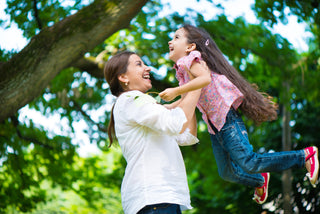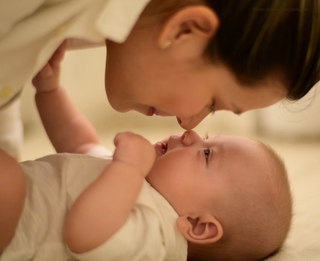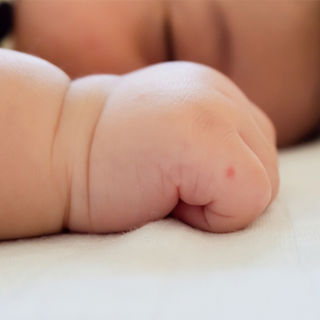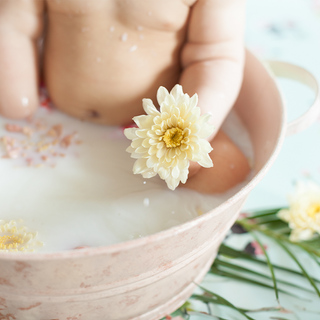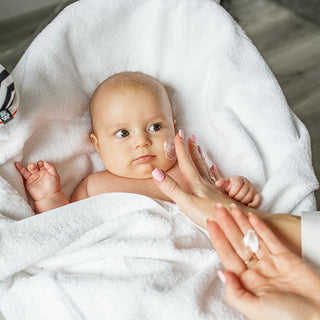
Watching your precious baby deal with any illness can be extremely worrisome and stressful for any parent. Which is why it’s important to have some basic knowledge of common illnesses and how to prevent and manage them if your baby does fall sick.
In this article, we’re going to talk about the “flu” and cover some basic ground such as - how try and distinguish between the flu and a common cold, how to protect your family from the flu and what steps to take if your little one catches a flu. But first, let’s understand what the flu is all about.
What is the flu and how does it spread?
Influenza (commonly known as the flu) is a contagious virus that affects the respiratory tract (nose, throat, and sometimes lungs) and can sometimes lead to complications. Most people affected with the flu tend to recover within a week or so. However, elder people and children younger than 5 years of age (more so those that are younger than 2 years of age), are at higher risk of developing flu-related complications. That is why, it’s important to be extra careful of and act promptly if your little one catches a flu.
How can your baby catch a flu? This virus spreads when an infected person coughs, talks or sneezes and the droplets land on the mouth or noses of people nearby, or are inhaled by them. This means that your baby can catch it by being in the vicinity of a person who is sick with the flu, or touching a contaminated surface.
How to spot signs of flu in babies?
Since your baby cannot communicate with you clearly just yet, it might sometimes be hard to ascertain if your baby has a flu or a common cold. If your baby suddenly develops a fever of 100 degrees F or more, and exhibits some of the symptoms listed below, it might be signs of the flu. But if your baby has a runny nose for a few days with/without a cough and then later develops a fever, this might be the common cold. In any case, it is always best to consult with your child’s doctor so they can guide you to take any necessary steps/medication before baby gets worse.
Here are some of the most common flu symptoms in babies to look out for:
• Baby has a fever
• Runny nose
• Cough
• Not feeding/eating as per usual
• Baby seems extra cranky or fussy – this could be due to body ache/headache/chills that are common flu symptoms
• Tummy troubles, diarrhea and vomiting
• Baby is crying and clutching at the ear – this could be a sign of an ear infection
Your baby may not necessarily exhibit all of these symptoms. However, this is a general indicator of what to look out for if your baby has the flu.
Important Note: If your baby’s symptoms worsen or if your baby has a seizure, looks blue, is unresponsive, has trouble breathing, severe vomiting, dehydration or an extremely high fever, take your infant to the doctor/emergency room immediately.
How to protect your baby from the flu?
The best way to protect your baby from the flu is to take simple preventative measures. Here are some of our top tips to help prevent your baby from catching a flu.
>Make sure your whole family takes the flu vaccine yearly
Getting the flu vaccine can greatly lower your child’s chances of getting the flu. For infants, the first dose is given at six months of age, followed by a second dose four weeks later. After this, the vaccine is administered on a yearly basis. You and your older kids should also take the flu vaccine yearly to help protect your family. You can also take the flu vaccine when you’re pregnant. This can actually help protect your baby against the flu.
>Wash hands, properly and frequently
Proper hand hygiene is the best way to protect your loved ones from germs. Teach your children to wash their hands properly and regularly with soap, especially before and after mealtimes, using the bathroom, playing outside, petting animals, etc. As your baby is still too young to wash their own hands, you can do it for them using warm water and soap. Make sure you too wash your hands regularly, especially while handling your infant, after changing their diapers, and so on.
>Stay away from people who are/might be sick
Flu germs can pass easily from one person to another, especially when you’re in the vicinity of a sick person. Keep your baby away from anyone who is or might be sick with the flu. If the sick person lives in the same house, keep baby in a separate room and make sure you use different towels, linen, cutlery and so on.
>Practice basic hygiene
Handwashing is your number 1 defense against the flu but you should also practice good hygiene in general. Clean and disinfect surfaces in your home regularly, especially if someone is or has been sick. Dispose of used tissues correctly.
How to manage flu symptoms in babies?
If your baby has the flu, first make sure you consult your baby’s pediatrician to see if they require any kind of medicine. Most flu medicines are not prescribed for infants and young children, unless they develop a secondary infection. In the case of a regular flu, your baby should feel better within a week or so.
The most important thing you can do is to make your little one as comfortable as possible during this time. Here are some tips to help you relieve some of their symptoms.
>Make sure baby has lots of fluids to prevent dehydration. If baby is still breastfeeding, continue to do so. If baby has started solids, you can offer appropriate liquids to help keep them hydrated.
>Baby might not be too hungry at this time so try offering them smaller meals through the day.
>Your little one needs lots of rest to recover. Try and limit their activity as far as possible and help them sleep. Lots of snuggles and tender love & care is what your baby really needs at this time.
>Baby’s nose might be stuffy, which might in turn make them uncomfortable and cranky. You can use a nasal suction bulb to suck out any mucus and clear your baby’s airways. You can even use a humidifier in their bedroom to help them sleep better.
If baby has cold and cough like symptoms, click here to read our blog “Home Remedies to Relieve your Baby’s Cough & Cold”.
Can you breastfeed baby if you have the flu?
Yes. Breastmilk contains antibodies that can actually help protect your little one and strengthen their immunity. If you are too ill to breastfeed, you can express your milk and have another healthy caregiver feed your baby from a bottle so that your baby can continue receiving breastmilk. Always wash your hands properly before and after pumping and/or storing milk. In case of a decrease in supply during any illness, enlist the support of a lactation consultant who can guide you correctly at this time.
How can you tell the difference between a flu and the coronavirus?
Some of the symptoms of a flu and the coronavirus are quite similar. The best way is to get yourself or your family member tested. If you suspect that you, your little one or a family member are sick, immediately take preventative measures to protect the rest of your family.
We hope you found these flu prevention and management tips helpful. Stay safe and stay healthy!
Note: The content in this article is meant to help guide and inform. It is not a substitute for professional medical advice. If your baby is sick with the flu or any other condition, make sure you consult your medical provider right away.






